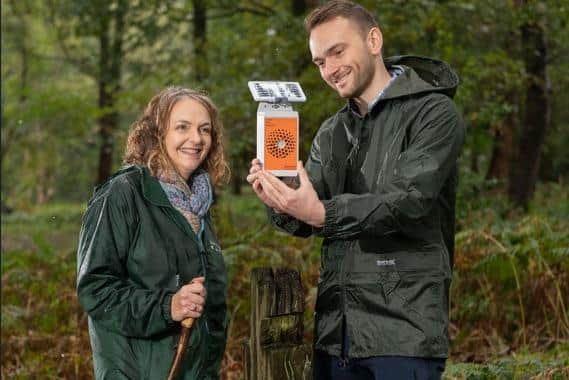How a new partnership is using AI to show impact of rewilding farmland in North Yorkshire
National rewilding project Make it Wild has teamed up with York-based start-up AgriSound to develop programmes for nurturing and boosting pollinator activity.
AgriSound, which usually helps businesses including Tesco and Marks & Spencer reduce their carbon footprints, has provided four ‘Polly’ bioacoustic listening devices to monitor and produce data on the biodiversity and wildlife in areas that Make it Wild manages.
Advertisement
Hide AdAdvertisement
Hide AdIt is the first time the devices have been used in a rewilding project. They allow Make it Wild to gather data-driven evidence to show its rewilding in Harrogate’s Bank Woods is leading to more pollinators and a significantly greater biodiversity than conventionally farmed land.


They use AI tracking algorithms to recognise the sounds of pollinators and provide data to improve land management strategies.
Over the last four months, the data collected has shown marked differences between pollinators levels across the site, and how the habitat influences the movement of pollinators.
This data, gathered in real time, is providing Make it Wild with the capability to track which areas have the highest number of pollinators, and demonstrate where there is a noticeable increase throughout Bank Woods, adjusted for seasonal variations.
Advertisement
Hide AdAdvertisement
Hide AdIt has found that pollinator activity has increased by 38 per cent since rewilding started at the site.
Helen Neave, founder of Make it Wild, said: "We know that pollinators are in deep trouble, and they are a crucial part of our ecosystem. In order to support our rewilding efforts and increase pollinator populations, we’re very much anticipating the use of data from these Polly devices.
"We are the only rewilding project to be using AgriSound’s monitoring devices, which can provide a crucial source of data on biodiversity.
"Rewilding is often mis-understood, and seen to threaten conventional farming, but we believe that the two philosophies of land management can work together."
Advertisement
Hide AdAdvertisement
Hide AdShe added: “We are...eager to demonstrate how we can make a difference in our impact on nature to reduce destruction and loss of habitat.
"The number one focus of our rewilding project is to increase biodiversity, and gathering data to show the positive results will be fundamental to our future success.
"We hope our partnership with AgriSound will underscore the importance of gathering demonstrable data for such initiatives and lay the ground for others to follow suit."
Casey Woodward, chief executive of AgriSound which was founded in 2020, said: "We’re constantly developing our AI bioacoustic monitoring technology to support an increasing variety of bespoke executions and we are excited to see how our data-driven approach to pollinator monitoring can be used in rewilding projects to protect and boost biodiversity.”
Advertisement
Hide AdAdvertisement
Hide AdMs Woodward added: "We’re being asked to develop algorithms for increasingly inventive uses of the Polly in order to protect pollinators alongside our regenerative farming projects, and this rewilding project sets an exciting precedent for how our bioacoustic monitoring AI technology can be used for conservation."